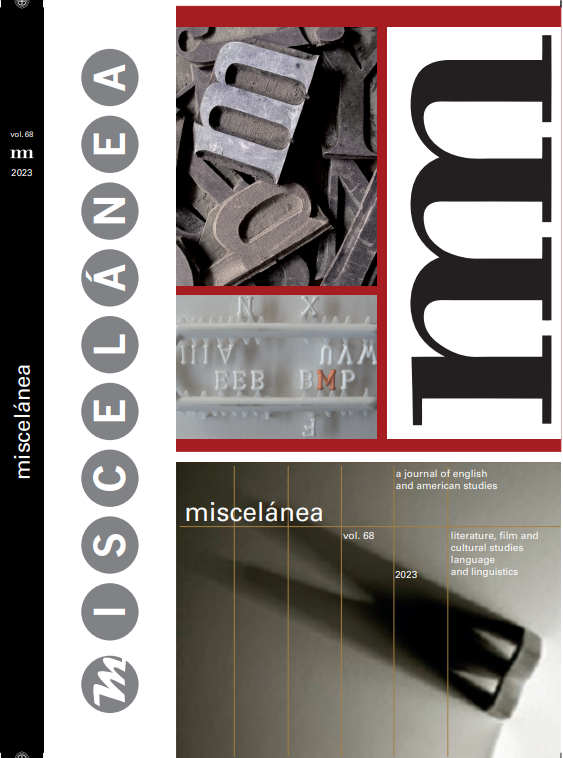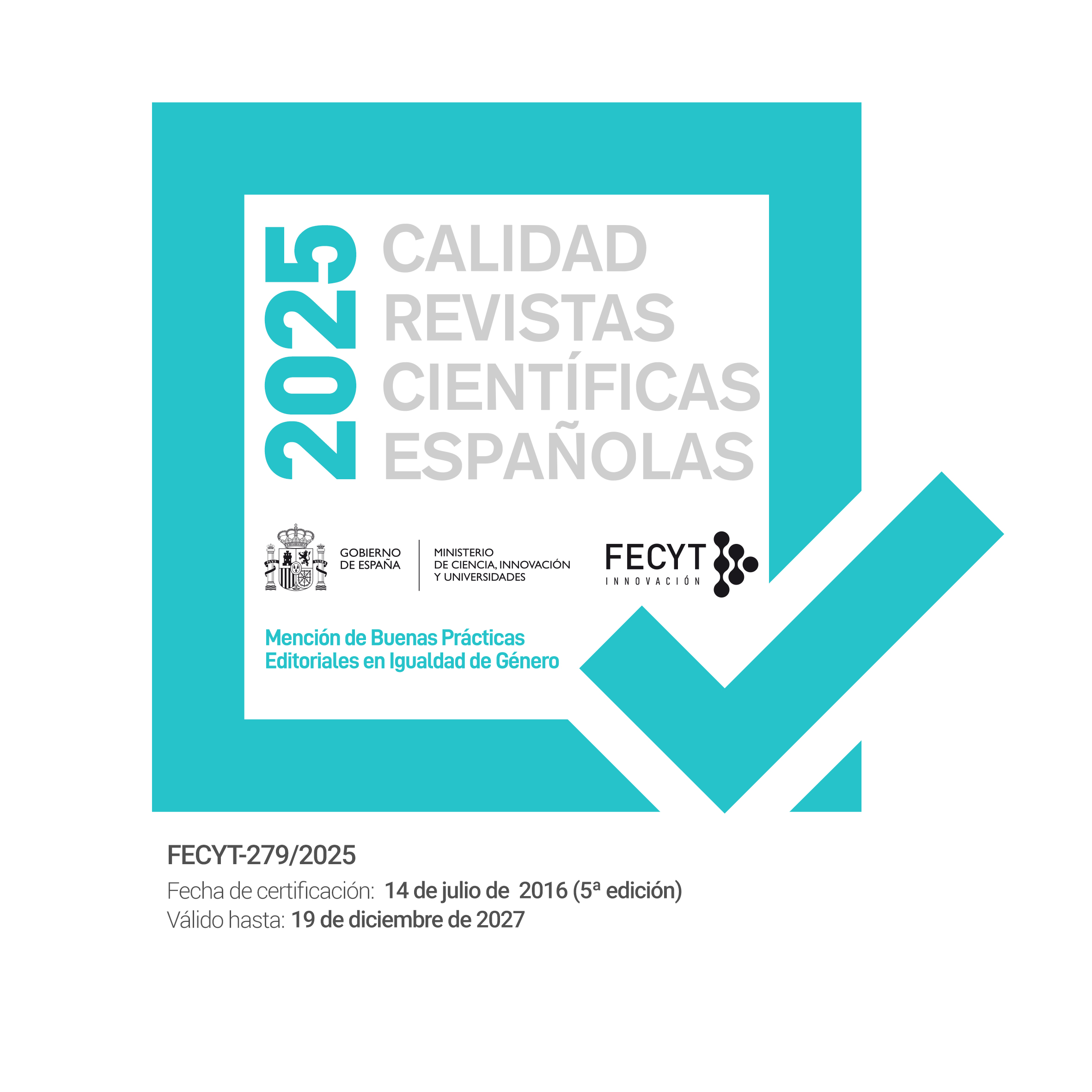“Sluts” and “Slaves”: The Internet and the Evolution of Fantasy in Dennis Cooper's Online Work
DOI:
https://doi.org/10.26754/ojs_misc/mj.20236878Keywords:
Cooper, digital iterature, flarf, found language, bugchasingAbstract
This article explores a yet unresearched part of Dennis Cooper’s production: his blog posts and, in particular, his “Sluts” and “Slaves” monthly posts, where he compiles explicit and sometimes sordid texts and images of gay sex workers apparently found online. First, this paper will situate these blog posts in the fields of citational and online literature, arguing that they are an example of ‘flarf’. In so
doing, it also extends the notion of “flarf” from poetry to narrative. Then, this paper explores the continuities and differences between the blog posts and Cooper’s other work, most notably The Sluts (2005), to argue that —while similar in their focus on the internet and “the impossibility of truth”— the blog posts present a significant transformation that compels readers to confront their own desires.
Downloads
References
Baker, Timothy B. 2012. “The Whole Is Untrue: Experience and Community in The Sluts”. In Hegarty, Paul and Danny Kennedy (eds.): 52-67.
Bauman , Zygmunt. 2000. Liquid Modernity. Cambridge: Polity Press.
Brantle y, Ben. 2014. “Karen Finley Relives the AIDS Epidemic in ‘Written Sand’”. The New York Times (October 14<https://www.nytimes.com/2014/10/16/theater/karen-finley-relives-the-aidsepidemic-in-written-in-sand.html>. Accessed September 4, 2023.
Brintnall , Kent L. 2012. “Transcribing Desire: Mystical Theology in Dennis Cooper’s The Sluts”. In Heinämäki, Elisa, P.M. Mehtonen and Antti Salminen (eds.) The Poetics of Transcendence. Berlin: Brill: 59-80. <https://doi.org/10.1163/9789401212090_005>.
Ciccoricco, David, Astrid Ensslin, Jessica Pressman, Hans Kristian Rustad , Jessica M. Laccetti and Alice Bell. 2010. “A [S]Creed for Digital Fiction”. Electronic Book Review (July 3, 2010). <https://electronicbookreview.com/essay/a-screed-for-digital-fiction/>. Accessed September 4, 2023.
Comitta , Tom. 2020. “A Brief History of Citational Fiction and the Literary Supercut”. LitHub(November 5, 2020). <https://lithub.com/a-brief-history-of-citational-fiction-and-the-literary-supercut/#:~:text=A%20citational%20fiction%20could%20read>.Accessed September 4, 2023.
Cooper, Dennis. 1991. Frisk. New York: Grove Weidenfeld.
Cooper, Dennis. 2005. The Sluts. New York: Carroll and Graft.
Cooper, Dennis. (ed.) 2007. Userlands: New Fiction Writers from the Blogging Underground. New York: Akashic Turnaround.
Dijk, Yra Van. 2015. “Amateurs Online: Creativity in a Community”. In Rettberg, Scott, Patricia Tomaszek and Sandy Baldwin (eds.) Electronic Literature Communities. Morgantown, WV: Centre for Literary Computing and ELMCIP: 45-68.
Epstein , Andrew. 2012. “Found Poetry, ‘Uncreative Writing’, and the Art of Appropriation”. In Bray, Joe, Alison Gibbons and Brian McHale (eds.) The Routledge Companion to Experimental Literature. London: Routledge: 310-322.
Férez Mora, Pedro Antonio. 2013. “Violence, Death, Sex and Psychoanalysis in Dennis Cooper’s The Dream Police”. Atlantis 35 (2): 81-98.
Férez Mora, Pedro Antonio. 2014. “Dennis Cooper’s ‘The Sluts’: Prosthetic and Performative (Homo) Sexuality”. ES: Revista de Filología Inglesa 35: 71-88.
Férez Mora, Pedro Antonio. 2022. “Eroticism as the Body without Organs in Dennis Cooper’s Frisk : Grand Narratives, Desire, and Infinity”. Textual Practice (March): 1-22. <https://doi.org/10.1080/0950236X.2022.2056760>.
Fisc her , Shell. 2009. “Can Flarf Ever Be Taken Seriously?” Poets and Writers (July/August). <https://www.pw.org/content/can_flarf_ever_be_taken_seriously>. Accessed September 4, 2023.
García-Iglesias , Jaime. 2022a. “‘We’re Just Fantasizing Aloud Here’: Fantasy and Online Communities in Dennis Cooper’s The Sluts (2005)”. English Studies 103 (4): 609-623. <https://doi.org/10.1080/0013838X.2022.2051919>.
García-Iglesias , Jaime. 2022b. “The New Owner and a Missing Author: Negotiating Authorship in Literary Creations of Online Subcultural Communities”. New Writing 19 (4): 376-390. <https://doi.org/10.1080/14790726.2021.1993265>.
García-Iglesias , Jaime. 2022c. The Eroticizing of HIV: Viral Fantasies. Health, Technology and Society. Cham: Springer International Publishing. <https://doi.org/10.1007/978-3-031-11352-9>.
Hayles, Katherine. 2008. Electronic Literature: New Horizons for the Literary. Notre Dame, Indiana: University of Notre Dame Press.
Hegart y, Paul and Danny Kennedy. (eds.) 2012. Dennis Cooper: Writing at the Edge. Brighton: Sussex Academic Press.
Hester , Diarmuid. 2020. Wrong: A Critical Biography of Dennis Cooper. Iowa City: University of Iowa Press.
Jacob, Benjamin. 2004. “Reading Obscenity”. PhD Disseration. Department of English and Related Literature, University of York, UK. <https://idp.nottingham.ac.uk/shibboleth-idp/profile/SAML2/Redirect/SSO?execution=e1s1>.
Kakutani , Michiko. 1996. “Designer Nihilism”. New York Times Sunday Magazine (April 21 <https://www.nytimes.com/1996/04/21/magazine/l-designer-nihilism-091707.html>. Accessed September 4, 2023.
Kennedy, Danny. 2012a. “Introduction”. In Hegarty, Paul and Danny Kennedy (eds.): 1-12.
Kennedy, Danny. 2012b. “Interview with Dennis Cooper”. In Hegarty, Paul and Danny Kennedy (eds.): 191-209.
Lethem, Jonathan. 2007. “The Ecstasy of Influence: A Plagiarism”. Harper’s (February). <https://harpers.org/archive/2007/02/the-ecstasy-of-influence/>. Accessed September 4, 2023.
Lev, Leora. 2006a. “Introduction: Enter at Your Own Risk: The Dangerous Art of Dennis Cooper”. In Lev, Leora (ed.) Enter at Your Own Risk: The Dangerous Art of Dennis Cooper. Cranbury, NJ: Fairleigh Dickinson U.P.: 15-41.
Lev, Leora. 2006b. “Sacred Disorder of the Mind: Sublimity, Desire Police, and Dennis Cooper’s Hallucination of Words”. In Lev, Leora (ed.) Enter at Your Own Risk: The Dangerous Art of Dennis Cooper. Cranbury, NJ: Fairleigh Dickinson U.P.: 200-224.
Lev, Leora. 2012. “Next: Vampiric Epistolary, Haunted Cyberspace, and Dennis Cooper’s Positively Mutant Multimedia Offsping”. In Hegarty, Paul and Danny Kennedy (eds.): 88-105. Lipovetsky, Gilles and Jean Serroy. 2007. L’Ecran Global : Cinéma et Culture-Médias à l’âge Hypermoderne. Paris: Seuil.
McHale, Brian. 2015. The Cambridge Introduction to Postmodernism. New York: Cambridge U.P.
Morrison, Aimée. 2013. “Blogs and Blogging: Text and Practice”. In Siemens, Ray and Susan Schreibman (eds.) A Companion to Digital Literary Studies. Oxford: John Wiley and Sons, Ltd.: 369-387. <https://doi.org/10.1002/9781405177504.ch20>.
Murray, Simone. 2015. “Charting the Digital Literary Sphere”. Contemporary Literature 56 (2): 311-339.
Shields, David. 2010. Reality Hunger: A Manifesto. New York: Alfred A. Knopf.
Sida hmed, Mazin. 2016. “Dennis Cooper Fears Censorship as Google Erases Blog without Warning”. The Guardian (July 14). <https://www.theguardian.com/books/2016/jul/14/denniscooper-google-censorship-dc-blog>. Accessed September 4, 2023.
Siemens, Ray and Susan Schreibman. (eds.) 2013. A Companion to Digital Literary Studies. Oxford: John Wiley and Sons, Ltd.
Tabbi, Joseph. (ed.) 2018. The Bloomsbury Handbook of Electronic Literature. Bloomsbury: London.
Young, Elizabeth and Graham Caveney. 1992. Shopping in Space: Essays on America’s Blank Generation Fiction. New York: Atlantic Monthly Press.
Downloads
Published
Issue
Section
License
Copyright (c) 2023 Jaime Garcia-Iglesias

This work is licensed under a Creative Commons Attribution-NonCommercial 4.0 International License.


